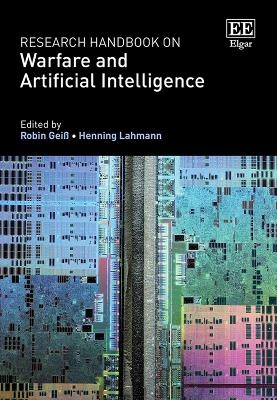
Research Handbook on Warfare and Artificial Intelligence
Edward Elgar Publishing Ltd (Verlag)
978-1-80037-739-4 (ISBN)
Providing critical perspectives on the future of AI and warfare, this Research Handbook advances important debates surrounding technology and its strategic and humanitarian implications. Contributing authors discuss topics including machine learning algorithms in decisions on the use of force, the definition and feasibility of ‘meaningful human control’, issues pertaining to data protection and privacy, and states’ positive obligations when deploying such systems. Ultimately, the book provides critical insights into one of the most contentious debates of our time and poses vital questions for the future of armed conflict.
Tackling practical issues in a detailed and engaging manner, this Research Handbook is an indispensable resource for students and scholars of international law, political science, technology and security studies. Its examination of crucial legal, ethical and political issues pertaining to the topic will also make it an invaluable read for policymakers and researchers at NGOs and think tanks.
Edited by Robin Geiß, Director, United Nations Institute for Disarmament Research (UNIDIR), Geneva, Switzerland and Henning Lahmann, Center for Law and Digital Technologies, Leiden University Law School, the Netherlands
Contents
Introduction to Research Handbook on Warfare and Artificial Intelligence 1
Robin Geiß and Henning Lahmann
PART I THE DIGITAL BATTLEFIELD
1 New military technologies and changes in warfare through the ages 10
Beatrice Heuser
2 Technology, economy and war: the disruptive force of AI 28
Giacomo Persi Paoli and Sarah Grand-Clément
3 Military applications of AI: current situation and future considerations 55
Larry Lewis and Diane Vavrichek
4 Digital battlefield: concept, technology and prospects 76
Elisabeth Hoffberger-Pippan and Anja Dahlmann
5 Risks and benefits of AI-enabled military decision-making 99
Vincent Boulanin
6 From strategy to orders: preparing and conducting military operations
with artificial intelligence 116
Tobias Vestner
PART II AI IN WARFARE: LEGAL AND ETHICAL ISSUES
7 Employment of AI in decisions on the use of force 136
Dominik Steiger
8 AI is changing the battlefield, but perhaps not how you think: an
analysis of the operationalization of targeting law and the increasing
use of AI in military operations 161
Merel A.C. Ekelhof
9 Aspects of realizing (meaningful) human control: a legal perspective 179
Bérénice Boutin and Taylor Woodcock
10 Big data and the future of belligerency: applying the rights to privacy
and data protection to wartime artificial intelligence 197
Asaf Lubin
11 Accountability and responsibility for AI-enabled conduct 216
Binxin Zhang
12 ‘Handle with care’: due diligence obligations in the employment of AI
technologies 234
Antonio Coco and Talita Dias
PART III SPECIFIC APPLICATIONS OF AI IN WARFARE
13 AI and military cyber operations 262
Heather A. Harrison Dinniss
14 Spying, artificial intelligence and the law of war 281
Russell Buchan
15 Employing AI to improve humanitarian action in times of conflict and crisis 298
Ana Beduschi
PART IV ADDRESSING THE CHALLENGES: THE WAY FORWARD
16 State positions on autonomous weapons systems 315
Gugu Dube and Mary Wareham
17 AI and the future of arms control 337
Jürgen Altmann
18 Regulating AI in non-military applications: lessons learned 352
Silja Vöneky and Thorsten Schmidt
19 The technological leap of AI and the Global South: deepening
asymmetries and the future of international security 370
Eugenio V. Garcia
Index 388
| Erscheinungsdatum | 21.08.2024 |
|---|---|
| Verlagsort | Cheltenham |
| Sprache | englisch |
| Maße | 169 x 244 mm |
| Themenwelt | Informatik ► Theorie / Studium ► Künstliche Intelligenz / Robotik |
| Recht / Steuern ► EU / Internationales Recht | |
| Recht / Steuern ► Öffentliches Recht | |
| Sozialwissenschaften ► Politik / Verwaltung | |
| Technik | |
| ISBN-10 | 1-80037-739-8 / 1800377398 |
| ISBN-13 | 978-1-80037-739-4 / 9781800377394 |
| Zustand | Neuware |
| Informationen gemäß Produktsicherheitsverordnung (GPSR) | |
| Haben Sie eine Frage zum Produkt? |
aus dem Bereich


